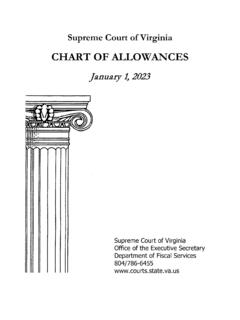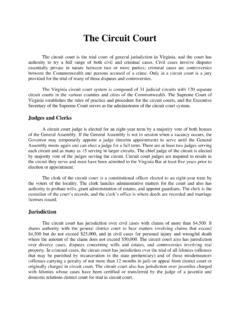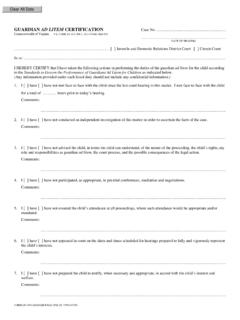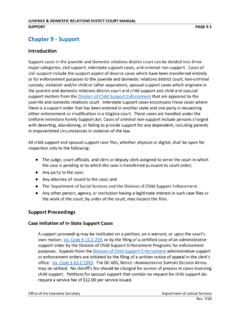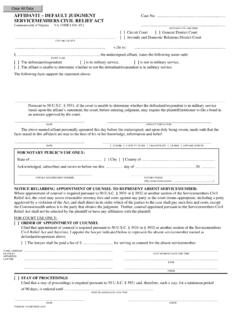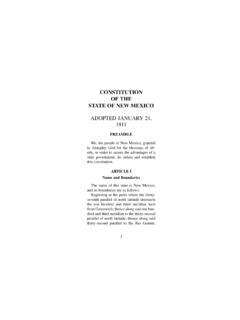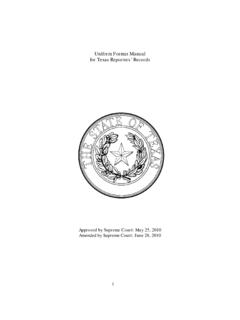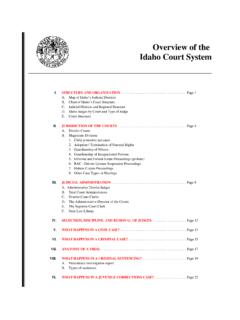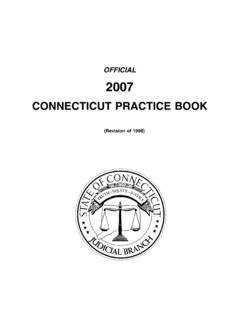Transcription of General District Courts
1 General District Courts There is a General District court in each city and county in Virginia. The General District court hears traffic violation cases, minor criminal cases known as misdemeanors, and civil cases such landlord and tenant disputes, contract disputes, and personal injury actions. The General District court does not conduct jury trials. All cases in this court are heard by a judge. jury trials are held only in circuit court, as provided by the Constitution of Virginia. The judge is sworn to enforce, without favor, the laws of the Commonwealth and community. By law, the court must apply rules of procedure and evidence to each case it hears. These procedures are applied uniformly, regardless of who is appearing before the court. If you are appearing in court, it is likely for one of the following reasons: You are a plaintiff because you filed a civil suit.
2 You are a complainant because you have caused criminal charges to be brought against someone. You are a defendant because someone is suing you, or you have been charged with a traffic violation or a criminal offense. You are a witness who has been called to testify. Types of General District Court Cases Civil Cases. The General District court decides civil cases in which the amount in question does not exceed $25,000, except for personal injury and wrongful death cases in which the amount in question does not exceed $50,000. In addition, unlawful detainer (eviction) suits that include a request for rent for commercial or agricultural property can be heard by the General District court even if the amount of rent requested is more than $25,000. A suit is begun by filing a civil warrant or complaint with the clerk of the court and paying a filing fee.
3 Criminal Cases. The Code of Virginia defines criminal offenses and sets penalties. For many offenses, the penalty prescribed is a fine. All fines collected for violation of state law are paid into the state treasury and credited to the Literary Fund. Fines collected for violations of city, town, or county ordinances are paid into the treasury of the city, town, or county whose ordinance has been violated. The amount of court costs is set by the General Assembly, and the court cannot suspend or waive costs. The General District court decides cases in which a person is charged with a misdemeanor. A misdemeanor is any charge that carries a penalty of no more than one year in jail or a fine of up to $2,500 or both. The General District court holds preliminary hearings in felony cases. A felony is any charge that may be punishable by more than one year in jail.
4 Preliminary hearings in felony cases are held to determine whether there is probable cause to believe the defendant committed the offense in order to justify certification of the charge to a grand jury in circuit court. The grand jury then determines whether there is probable cause for the defendant to be tried in the circuit court. Each defendant in a criminal case is presumed innocent until proven guilty beyond a reasonable doubt. Upon consideration of the evidence, the judge decides the question of guilt or innocence and, on a finding of guilt, determines which penalty, if any, is proper and lawful. Traffic Cases. The General District court hears cases in which a person is charged with a traffic offense. Most traffic offenses are traffic infractions, which are generally punishable by a fine. If you are convicted of certain traffic violations, the Virginia Division of Motor Vehicles (DMV) will assess points against your driver's license.
5 This is an administrative action by DMV and is in addition to any sentence imposed by the judge. Your Rights in Court You have the right to retain and be represented by your own lawyer in all matters before the court. However, you may waive representation by counsel and represent yourself. You have the right to have the clerk's office subpoena witnesses to appear in court on your behalf. You may ask for a continuance if you have good cause to have your case postponed until a later date, although the judge does not have to grant your request. If you are the complainant in a criminal proceeding, the Commonwealth's Attorney, who represents the Commonwealth, will normally prosecute the case. If you are charged with a crime for which the penalty includes the possibility of a jail sentence, and you state that you are indigent and cannot afford a lawyer, the judge will examine your financial status.
6 Based on results of the examination, and your financial statement under oath that you cannot afford an attorney, the judge may assign an attorney to represent you. The cost of such attorney will be included in your court costs if you are found guilty. Criminal and Traffic Cases If you are a defendant: When your name is called, come forward with your lawyer, if you have one, and witnesses and stand before the bench. The charge will be read. If you do not understand the charge, ask the judge to repeat or explain. If you are asking for a continuance (postponement), do so now, and give your reason. You answer the charge by saying guilty or not guilty or "nolo contendere" (no contest). When you plead guilty, . you admit that you broke the law as you were charged and are agreeing to accept any penalty set by law and imposed. If your plea is guilty: The judge may hear a brief statement from the officer, prosecutor or individual who brought the charge against you.
7 The judge may ask you if you wish to make a statement, which would allow you to provide additional information about what occurred. The judge will find you guilty or not guilty and may sentence you. If your plea is not guilty: The witnesses who bring evidence against you will be heard first. You or your attorney may cross-examine each witness. When you are accused of a criminal charge, you may present witnesses on your behalf, but you do not have to testify yourself unless you wish to do so. After your evidence is presented, witnesses against you may present testimony again in rebuttal. The judge will then give his or her decision. If the judge finds you NOT guilty, dismisses the case against you, or grants a motion not to prosecute, you are free to go. If the judge finds you guilty and you do not appeal the case, you must satisfy the sentence by: Paying in full to the clerk of the court any fines and court costs.
8 Surrendering your driver's license to the clerk if so ordered by the judge. Serving any time in jail imposed by the judge. Complying with an alternative sentence as ordered by the judge. Failure to Appear In criminal and certain traffic cases, if you fail to pre-pay the fine and costs (when allowed) and also fail to appear in court, a separate warrant may be issued against you on a new charge of failure to appear. You then will have to stand trial on that charge, as well as the original charge. Small Claims Civil Cases Very often a citizen has a valid claim, which can be satisfied only by a legal proceeding, but the claim may be too small in value to justify hiring a lawyer. Many of these claims will be for less than $4,500. In Virginia, claims at or below this amount can be initiated only in General District court. Although General District Courts can determine larger claims, they are the only Courts in Virginia where suits may be filed for claims of $4,500 or less.
9 Where Can a Civil Suit Be Brought? To get the person you want to sue (the defendant) into court, you must bring suit in one of the places authorized by law. The simplest rule is that you bring suit in the city or county where the defendant lives, is regularly employed, or has a regular place of business. You may also bring suit in the city or county where your cause of action arose (where the act on which your claim is based took place). If the defendant is a non-resident of Virginia, you may bring suit wherever the defendant can be found or owns property within the state. If you wish to sue a corporation, you may do so in the city or county in which either its principal office or registered agent is located. This information may be obtained from the Office of the Clerk for the State Corporation Commission located in Richmond, telephone 866-722-2551 or A foreign corporation (one not originally incorporated in the state of Virginia) can be sued in the location where the statutory agent resides, where its registered office is situated, or, in case of withdrawal from the state, where its last statutory agent resided, where its office was situated, or where it has any estate or debts owing to it within Virginia.
10 How Long Do You Have to Bring a Suit? The time you have is determined by law and depends on the nature of your claim. You must bring your action within the period known as a statute of limitations. While you may have three years to bring a claim on a contract, you should initiate your action as soon as possible because some claims have a much shorter time frame within which you must file your suit. Your action has been legally commenced when the necessary information has been filed with the officer who is going to issue your warrant and the required fee has been paid. This commencement will become void, however, if the warrant is not subsequently served upon the defendant and properly returned to the court. How to Start Your Suit You may bring your suit in a District court by either a warrant or complaint. The warrant is the simpler procedure.
